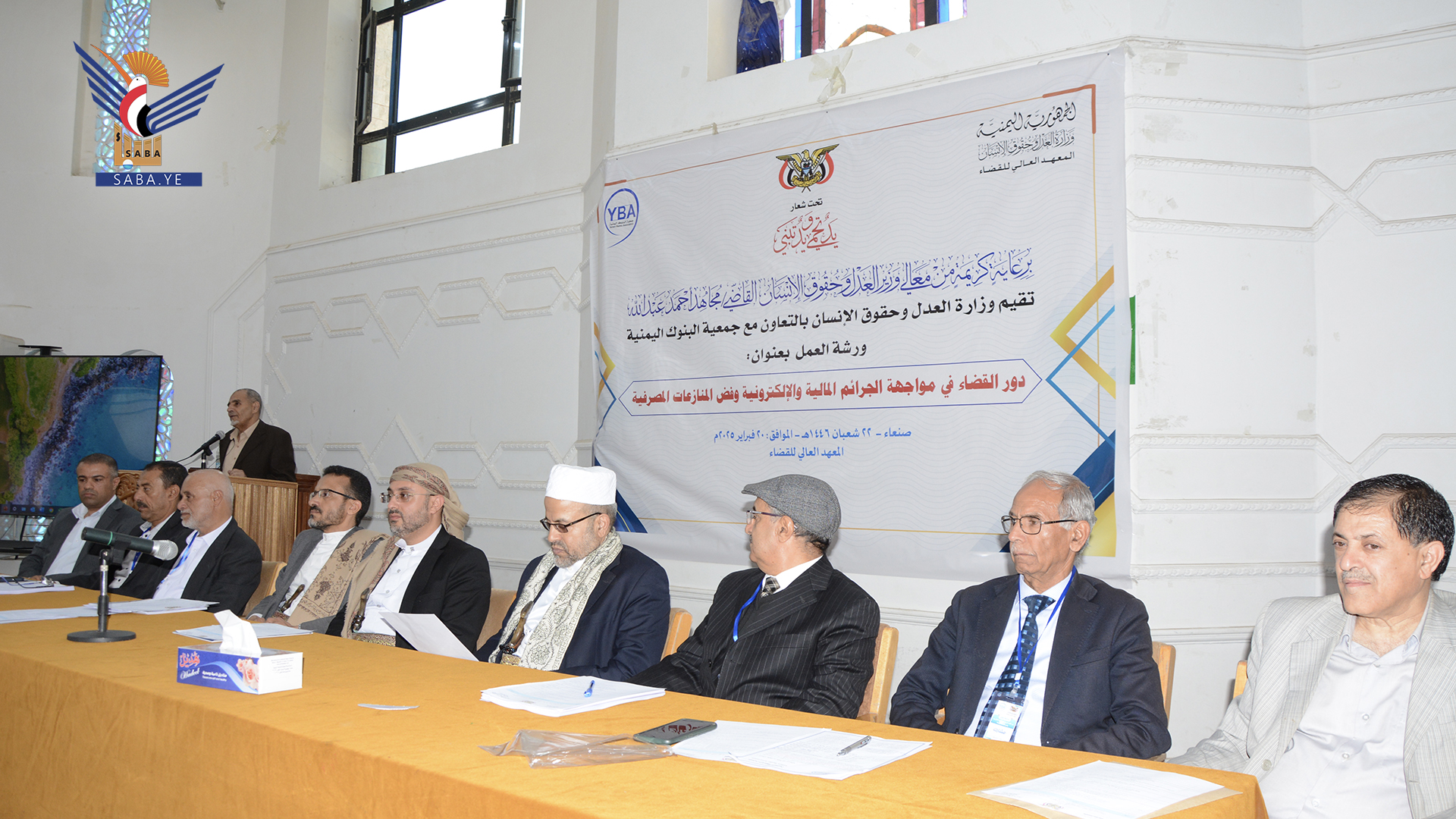Sana'a - Saba:
The Ministry of Justice and Human Rights, in cooperation with the Yemeni Banks Association, organized a workshop on the role of the judiciary in confronting cybercrime and resolving banking disputes.
At the opening of the workshop, which was attended by 70 participants representing the judiciary and the banking sector in Yemen, the President of the Supreme Judicial Council, Judge Dr. Abdulmumin Shujaa al-Din, stressed that the judiciary attaches special importance to resolving banking disputes as the banking work is the pillar of the national economy, especially during this critical period in which Yemen is exposed to continuous aggression and an unjust blockade.
He noted that the judiciary will do its best to absorb the recommendations and results of the workshop, which brings together bankers and judges who have combined scientific and practical skills.
Deputy Minister of Justice and Human Rights, Judge Ibrahim al-Shami explained that the Ministry of Justice and Human Rights sought to hold workshops and training courses to qualify the judicial staff in this field, especially with the issuance of the new investment law, in addition to the ministry's endeavor to include in the curricula of the Higher Institute of Judiciary materials related to combating cybercrime and limiting its spread.
For his part, the Dean of the Higher Institute of Judiciary, Judge Dr. Muhammad Al-Shami, considered that paying attention to the issue of cybercrime and resolving banking disputes is one of the most important topics that must represent the integrated system in accordance with the Qur'anic process, which is not limited to progress in one field without another. He urged concerted efforts in various fields that serve the nation.
Dr. Hamoud Al-Najjar, a member of the Board of Directors of the Central Bank of Yemen, stressed that the judiciary is a key pillar in resolving cybercrime disputes in the banking sector, as it works to apply the law, protect rights, and ensure justice
For his part, the Acting President of the Yemeni Banks Association, Mahmoud Qaid Naji, reviewed the importance of shifting to digital systems and developing means of protection and cybersecurity, considering this an urgent necessity to ensure the safety of societies and protect the national economy.
The recommendations of the workshop emphasized the need to expedite the completion of the procedures for issuing the law on information technology crimes , cybersecurity, and to coordinate with the leaders of the judiciary to hold multiple workshops for prosecutors and court judges on cyber crimes to deepen their concept, methods of investigation, trial procedures, and possible penalties until the issuance of the relevant law.
The workshop also emphasized the need to rehabilitate law enforcement authorities and build the capacities of criminal justice personnel to ensure that cyber-criminal activities are addressed, and to benefit from the experiences of countries in the field of cybersecurity and combating cybercrime.
The workshop recommended the establishment of cybercrime departments in the research and security departments in the provinces and directorates to take charge of evidence gathering procedures , to qualify their cadres and provide them with competencies, as well as the scientific and practical training of police officers, prosecutors and judges in the use of modern tools, their working mechanisms and electronic evidence extracted from them.
The workshop outcomes urged the addition of courses related to cybercrime and cybersecurity in the curricula of the Higher Judicial Institute, police academies, law and law faculties, in addition to establishing a specialized division for cybersecurity , cybercrime in the judiciary and providing it with a special criminal laboratory for electronic evidence and providing the necessary capabilities to enable it to work.
The recommendations called for the training of investigators, judicial officers and those involved in the collection and preservation of such evidence, as well as the training of lawyers, law professors and those dealing with these means from merchants and official departments about electronic dealing, its risks and legal controls so that they can recognize and understand them and absorb the issues resulting from them.
It emphasized the need to develop the state's criminal policies and national legislation in line with the special nature of cybercrime, adopt effective strategies to confront it, involve the private sector and other stakeholders in designing these policies , strategies, and distribute responsibilities in a flexible and effective manner.

| more of (Local) |



